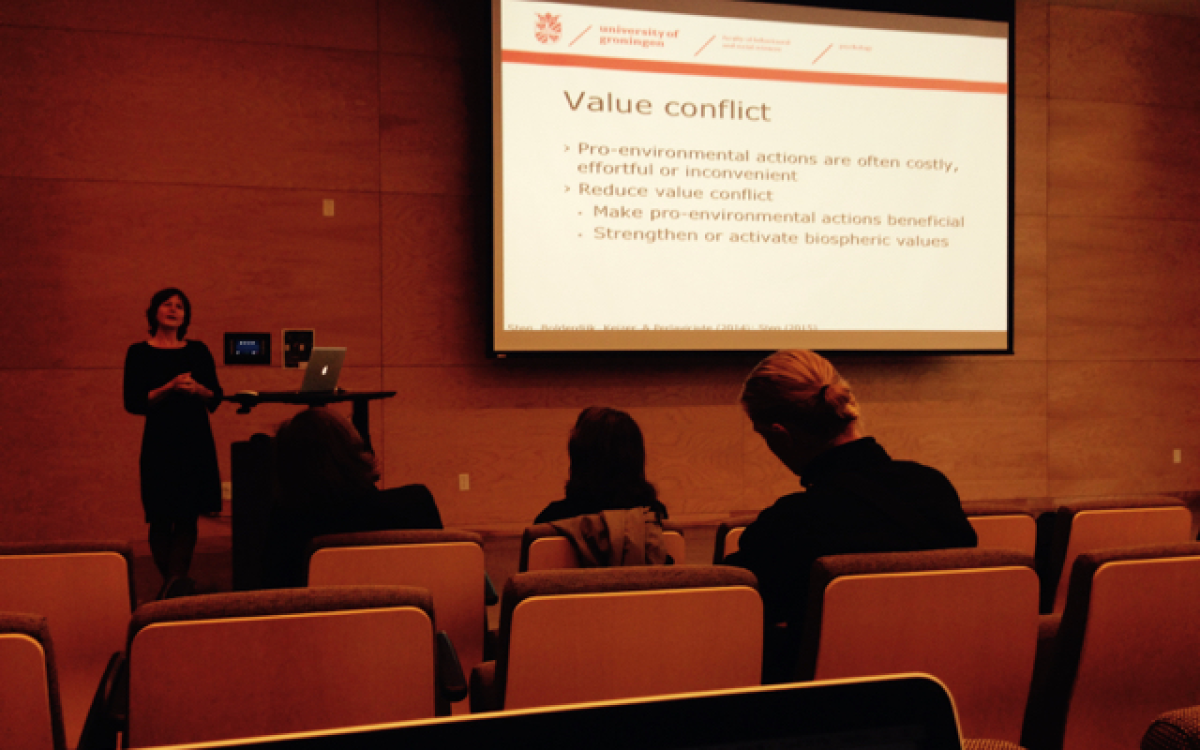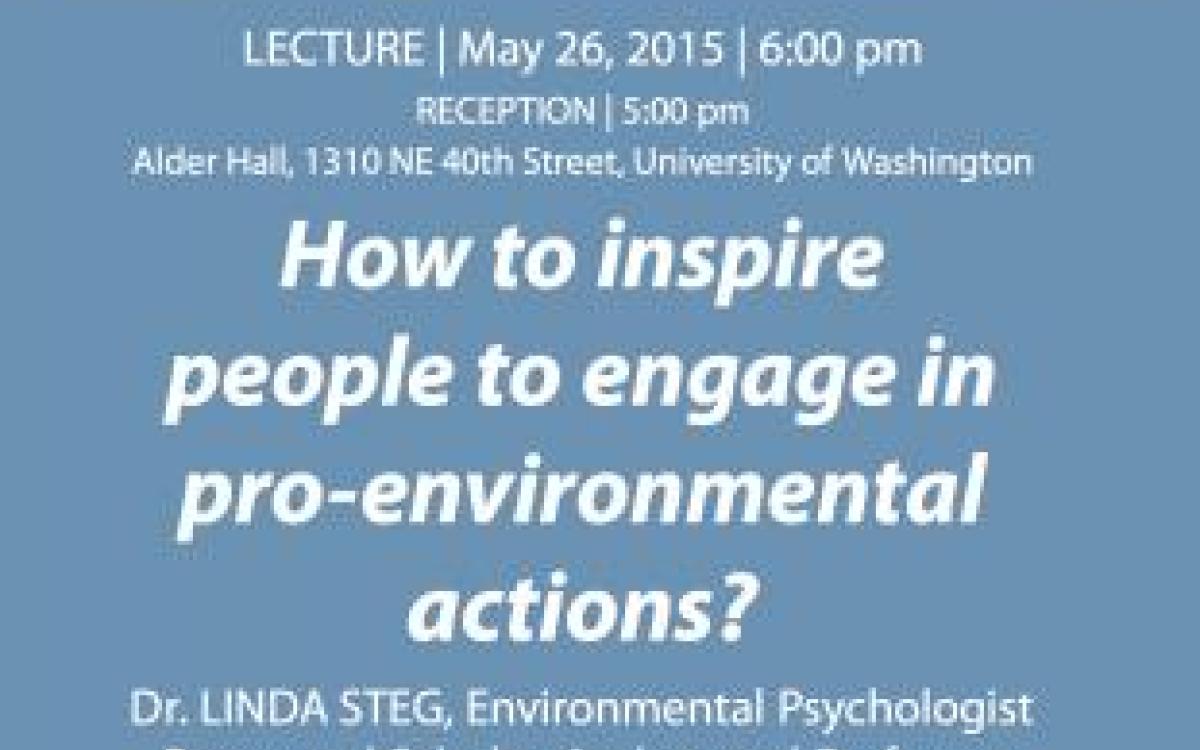At a glance
This research project explores how building and neighborhood design can encourage sustainable behavior and reduce carbon… Read full summary
- Funding received
- 2014-2015
- Small
- Awarded
- $700
- Funding partners
-
- Services and Activities Fee (SAF)
This research project explores how building and neighborhood design can encourage sustainable behavior and reduce carbon emissions by integrating environmental psychology with energy-efficient technologies. Led by a PhD student in architecture, the study examines how values, goals, and place attachment influence pro-environmental actions. In collaboration with experts from UW and international institutions, the project includes educational outreach such as public lectures, faculty discussions, and national conference panels to promote behavior change and support UW’s Climate Action Plan.
Environmental impact
According to the US Energy Information Administration, Annual Energy Outlook 2015, it is estimated that the delivered energy intensity for residential and commercial sectors will see the greatest increase in the end uses that individual behavior has a direct influence over. By 2040, miscellaneous electric loads (plug loads) will increase nationally by 5% in residential use and 10% in commercial use. Fully one quarter of the energy use intensity of educational facilities is ascribed to user behavior. Increasingly, behavioral and lifestyle choices that an individual person engages in are seen as behaviors that support or hinder sustainable energy use patterns. Lifestyles (in the home, neighborhood, community, and beyond) have become central to the design and functionality of sustainable performance levels of buildings and communities (e.g. energy targets and transportation use) and taken together, in the aggregate, user behaviors have a significant impact on U.S. and global carbon emissions. As an architect and PhD student, my interest is to investigate the integration of a theoretical framework based in environmental psychology and the design of buildings and neighborhoods that promote well-being (people and planet) and abundance (resources and technologies) in the environment. In other words, by linking high performance energy efficient technologies in the built environment with a deep understanding of pro-environmental human behavior, architects and planners can design in a way that affirms and reinforces pro-environmental behaviors in the context of the built environment. This research seeks to understand the relationship between values, goals, situational factors and the influence of place attachment in the context of an integrated framework for the design and planning of high performance buildings and neighborhoods. This work is particularly salient in meeting the UW Climate Action plans goals to reduce carbon emissions and engage students, staff and faculty in the endeavor through behavioral choices.
Student leadership & involvement
As an architect and PhD student, my interest is to investigate the integration of a theoretical framework based in environmental psychology and the design of buildings and communities that promote well-being (people and planet) and abundance (resources and technologies) in the environment. In other words, by linking high performance energy efficient technologies in the built environment with a deep understanding of pro-environmental human behavior, I believe that architects and planners can design in a way that affirms and reinforces pro-environmental behaviors in the context of the built environment. My research seeks to understand the relationship between climate change and actual energy use, values, goals, situational factors and the influence of place attachment in the context of an integrated framework for the design and planning of high performance buildings and communities. To accomplish this research, I am bringing together and collaborating with an interdisciplinary and international team of researchers. Dr. Manzo, Dr. Steg and Professor Loveland all serve on my PhD committee.
Dr. Lynne C. Manzo, is an environmental psychologist and Associate Professor in the Department of Landscape Architecture at the University of Washington, Seattle. Dr. Manzo's work focuses on place attachment, place meaning, identity and social justice as applied to affordable housing, cultural landscapes and community participation. We are investigating the relationship between place attachment and place identity on fostering pro-environmental behavior to reduce energy use and carbon emissions.
Dr. Linda Steg is a professor in environmental psychology at the University of Groningen. Her research focuses on factors influencing pro-environmental behavior, in particular household energy use. She studies the effectiveness and acceptability of environmental and energy policies, and how environmental conditions and policies affect individual quality of life. We are investigating the empirical evidence for pro-environmental behavior including the sequence beginning with biosphere values, environmental self-identity and promoting environmental preferences, intentions and behaviors.
Joel Loveland is the Mithun/Russell Professor of Sustainability in Architecture and the Director of the Center for Integrated Design in the School of Architecture, College of Built Environments, and University of Washington. Professor Loveland is grounding the theoretical work in the realities of National, regional and local energy use databases, and studies on energy systems.
Education, outreach, & behavior change
As a part of our research work and as an actionable part of the work, my committee and I are engaging in several outreach and educational events to foster behavior change. Beginning on May 26th, we will share information on pro-environmental behavior with students, faculty, and professionals both on and off the campus. The first event is a free public lecture on the UW campus in Alder Auditorium on May 26th from 6:00 to 8:00 where Dr. Steg will speak on “How to inspire pro-environmental actions.” The second event is a small group discussion with faculty and students from the College of the Built Environments and the College of the Environments in the afternoon of May 26th. The third event is a panel discussion to take place at the national EDRA (Environmental Design and Research Association) conference in LA. This panel will consist of the entire interdisciplinary team.
Feasibility, accountability, & sustainability
We estimate that the costs involved in assembling the panel in Seattle to conduct outreach and education at the University of Washington will be approximately $4000. We have already raised $3,300 of these funds through the College of the Built Environment, the College of the Environment, Seattle based professional practice architectural and construction firms, and King County Green Tools. We are asking the CSF to support $700 to be put toward expenses for Dr. Steg who is traveling from the Netherlands.
Julie Kriegh
Project lead
- Julie@kriegharchitects.com
- Affiliation
- Student
Lynne Manzo
Team member
- lmanzo@uw.edu
- Affiliation
- Faculty

